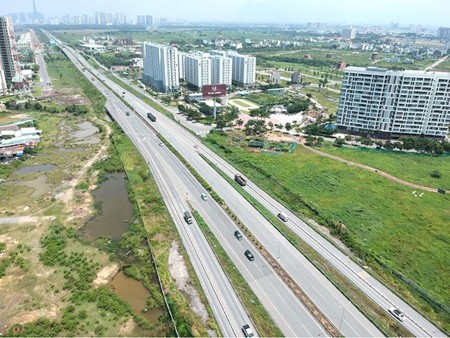
Accordingly, there should be three specific time frames to fulfill the compensation and resettlement tasks.
The first time frame is no later than 240 days from the date of formal land reclamation notice. This duration is used to finish the task of compensation and resettlement for related residents.
Particularly, if the project is to reclaim a huge surface area, including accommodation of citizens, these people have to be relocated suitably. Even if these people do not meet necessary compensation requirements but they do not have any where else to live, they will still receive sufficient support from policies within the authority of the HCMC People’s Committee.
These tasks are normally identified and then proposed by the People’s Committee in district level.
If necessary, related state units should approve the time division of those tasks for the sake of convenience.
The second time frame is 30 days at the latest from the ratification date of compensation and resettlement methods. It is used to actually carry out compensation payment and resident relocation.
Lastly, if 100 percent of households related to the land reclamation agree to hand over the property, it should take no more than 30 days for the local authorities to take possession of the land.
However, if fewer than 5 cases have to be forced to move out of the related surface area, it should take between the minimum of 60 days and the maximum of 120 days from the date of finishing compensation payment task or payment deposit to a temporary account in the Vietnam State Treasury to evict them.
If there are more than 5 households involved, the eviction time should be from 120 days to 180 days.
Regarding projects using Official Development Assistance (ODA) funds, there must be additional time for the Prime Minister to approve the compensation and resettlement time frame.
At the moment, several parts in this mechanism are not in the legal regulation and beyond the authority of the HCMC People’s Committee. Therefore, it suggests the Ministry of Natural Resources and Environment to ask the Prime Minister to allow the city to be more active in issuing the adjustment rate for land compensation price annually.
This will become the foundation to collect the public’s opinions on compensation and relocation methods as well as announcing the decision to reclaim land, to pay compensation, and to support resettlement (according to Point 2 in Article 67 of the 2013 Land Law of Vietnam).
Right now, the city is still trying to use the most updated land price to calculate payment for those who do not agree with the suggested compensation method (according to Point 2 in Article 74 of the 2013 Land Law of Vietnam).
In the near future, HCMC is going to prepare more common regulations on management tasks for land reclamation to speed up land-related project duration.
The Ministry of Natural Resources and Environment has agreed with the suggestion and will proceed this with the central government so that HCMC can transparently implement the mechanism in all state units in the city, can independently carry out the compensation and resettlement tasks without relation to the project, especially ODA ones .
This ministry also recommends that the government should consider the reality of HCMC in approving the ‘special’ mechanism for land compensation, and then carefully evaluate this pilot in order to apply it nationwide.
In HCMC, since the 2013 Land Law of Vietnam was in effect, there have been 972 projects that need to reclaim 7,197ha surface area. However, only 260ha of that was successfully retrieved to carry out 150 projects. The other 822 ones are temporarily halted due to failures in land compensation and relocation tasks.
























